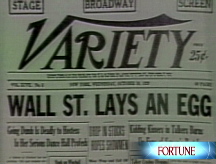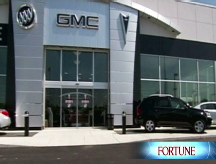A collapsed hedge fund's overlooked wind wager
Tontine became famous for its large, contrarian bets. When it decided to invest in wind energy, it was able to make a ton of money.
NEW YORK (Fortune) -- Tontine Associates, the once gilt-edged hedge fund that collapsed rapidly over the past two months in the wake of the market's carnage, was renowned for its massive and highly contrarian bets in industries like home-building and steel manufacturing.
Until the Greenwich-based fund began to spiral out of control in August, Tontine and its general partner, Jeff Gendell, seemed to have the Midas touch. It earned 100% returns in 2003 and 2004 in its Tontine Partners fund, buying shares in sectors where other institutions feared to tread. The success soon drove the fund to $11 billion in assets and made Gendell a billionaire.
Last week, however, the combination of big bets gone south and prime brokers demanding repayment for loans forced Gendell to announce to investors that he was shutting two of his main portfolios: Tontine Capital Partners and Tontine Partners, after locking up losses as high as 77%.
But at the center of the Tontine maelstrom is a less well-known series of trades in alternative energy stocks, especially those related to wind turbines, that played a key role in the both the fund's recent success and its collapse.
Starting last year, Tontine's funds have built massive stakes in several well-known companies that have units involved in the servicing or manufacturing of wind-turbine components - Quanta Services (13.5 million shares) and Trinity Industries (10.8 million shares). These bets became some of the first casualties of the market rout: Market sources told Fortune that by the end of October, with their stock prices at multi-year lows, the funds had sold or had margin calls on these two positions to the point where they no longer have a stake in the companies.
Less explicably, Tontine also bought into less well-known companies like Broadwind Energy and Miscor Group, thinly-traded (and lightly regulated) OTC bulletin board stocks where Tontine's mammoth controlling stakes - it owned 47 million shares, or just under 49% of Broadwind - essentially made it the market for the shares.
A spokesman for Tontine did not return a call seeking comment
From an economic standpoint, the trades made sense on paper for Tontine. The fund made its first 10 million shares of Broadwind - then known as Tower Tech - for $1.50 early year, a sharp discount to the then-market price of $2.75.
But from an investing standpoint, the stake in Broadwind (or any other bulletin board-traded company) was fraught with risks. If Tontine ever had to sell part of its stake, or Broadwind hit a rough patch, the stock price was sure to collapse rapidly as investor's sold in front of the fund.
Gendell's Broadwind bet was rescued more than once from stagnation by a high-profile media admirer.
In a two-week period this May, after an enthusiastic endorsement from CNBC and Street.com commentator Jim Cramer, the stock shot up to $28 from $13.50, a $700 million increase in value for Tontine's position in just two weeks. By June 30, Tontine's Broadwind position increased in value by $500 million.
On Oct. 13, after Tontine's disastrous September performance came to light, Cramer again touted the stock, sending it up over 50% the next day to $11 from a low of $7.
The Broadwind trade was no fishing expedition for Tontine - it would end up investing over $500 million into the Napierville, Ill.-based company, amounting to just over 4% of its capital base. And therein lies an element of irony, as wind-generation is only a fraction of the company's business mix. In fact, its most recent purchase was a trucking company.
According to its first quarter 10-Q filing, only $6.8 million of $35.2 million in revenue came from [wind] "towers & fabrications." The company stopped breaking out these details in the second quarter.
For the first nine months of the year, according to its just-released 10-Q filing, Broadwind lost $8.8 million on just over $140 million in revenues (after making several acquisitions). It used $5.8 million in operating cash, although with $117 million in stock sales, its cash position increased by $28 million.
There is a much, much larger problem for Broadwind however: Last Tuesday, Tontine filed forms with the SEC indicating its desire to register its privately-placed stock for sale. This is likely to be a massive overhang for the foreseeable future on Broadwind's slumping stock price, which has already dropped to $7.15 from over $28 in early June.
Tiny South Bend, Ind.-based Miscor Group would appear an even unlikelier object of affection for the hedge fund. It entered the wind-power turbine repair and service business last year, and is primarily a company that services and repairs industrial motors. Until late last year, Miscor was quite literally a penny stock, with its stock trading around 25 cents a share.
Last year, after Tontine purchased 49% of the company, Miscor did a 1-25 reverse split, sending its stock to the $5 range. By mid-January however, the stock had shot up to over $16, giving the fund a handsome 300% return on its money.
In short, the fund spent $32.5 million to acquire a commanding stake in a thinly-traded company that was worth about $98 million in under one year.
While the company is profitable, without Tontine's sponsorship, Miscor's share price has since drifted lower to the $2.40 range. ![]()
-
 The retail giant tops the Fortune 500 for the second year in a row. Who else made the list? More
The retail giant tops the Fortune 500 for the second year in a row. Who else made the list? More -
 This group of companies is all about social networking to connect with their customers. More
This group of companies is all about social networking to connect with their customers. More -
 The fight over the cholesterol medication is keeping a generic version from hitting the market. More
The fight over the cholesterol medication is keeping a generic version from hitting the market. More -
 Bin Laden may be dead, but the terrorist group he led doesn't need his money. More
Bin Laden may be dead, but the terrorist group he led doesn't need his money. More -
 U.S. real estate might be a mess, but in other parts of the world, home prices are jumping. More
U.S. real estate might be a mess, but in other parts of the world, home prices are jumping. More -
 Libya's output is a fraction of global production, but it's crucial to the nation's economy. More
Libya's output is a fraction of global production, but it's crucial to the nation's economy. More -
 Once rates start to rise, things could get ugly fast for our neighbors to the north. More
Once rates start to rise, things could get ugly fast for our neighbors to the north. More









